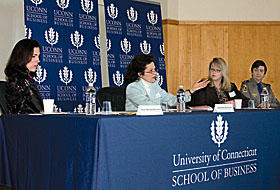  |
| HOME | THIS ISSUE | CALENDAR | PTR | BACK ISSUES | < BACK | NEXT > |
Female business leaders urge students to step out of comfort zoneby Scott Brinckerhoff - April 16, 2007 |
||||
| Challenge yourself; take chances; try the unusual; sometimes say no. Those were among the suggestions a group of professional women in business offered April 6 for female students preparing for corporate careers. The event at the School of Business addressed work and life issues, advancing in a male-dominated environment, networking, and managing personal finances. Sponsored by the UConn Chapter of the National Association of Women MBA’s and hosted by associate professor Lucy Gilson, the event featured speakers who offered diverse and sometimes provocative points of view: “Recognize what your comfort zone is and is not,” said Lisa Douglas, vice president of informatics at Cigna. “Force yourself outside the comfort zone.” For many in corporate life, this will mean “leading a team and getting them to deliver” rather than performing well on a strictly individual basis. Melissa Cummings, director of leadership development at Cigna, struck a similar note: “Don’t always play to your strengths. Challenge yourself. Build your skills.” Lorraine Aronson, UConn’s vice president and chief financial officer, added, “Keep your options open. Follow your heart. Be willing to take some chances, and remember that it’s easier to succeed when you’re doing something you love.” Anne Melissa Dowling, a senior vice president at MassMutual, said she learned early in her career that speaking up is important. “I would suggest simple things that no one else was suggesting,” she said. “I wasn’t afraid to stand alone, and I found that people often fell in behind me.” One of the conference’s goals was to encourage mentoring, which Gilson said seems to come more naturally to men than women. Several speakers on various panels picked up the theme that women have to demonstrate their capabilities more than men do in the same work environments, in order to gain respect. Capt. Sarah Kasacek, in the state police since 1980, said she moved ahead in her law enforcement career by building a reputation for competence and taking training courses whenever they were offered. She attended the FBI academy and earned a master’s degree at age 47. She said she tells her female colleagues, “if you want to get ahead, take that extra step.” The panelists showed that there is no single route to success, nor any magical one. For most of them, common sense and being honest with themselves were key.
Elena Torban, who came here from Russia and is now a procurement manager in a new aircraft program at Hamilton Sundstrand, noted that her company is dominated by men, and engineers, and that her background is liberal arts. But she said she has always been offered new jobs within Hamilton’s parent, United Technologies, and feels she has had the support of bosses and co-workers. Her rules of the corporate road: “Ask for help. Be persistent. Know what you want and be able to say no. Only you know what is right for you.” Torban also said delivering on commitments is essential. For Erin Hatzikostas, head of strategy at Aetna Global Benefits, the balance between work and life raised itself unambiguously when she declined an opportunity in London because she and her husband were thinking about starting a family. “It was a big decision, but you have to be able to say no for the right reasons,” she said. Panelists talked about risk taking, good and bad bosses, and even the role of luck in career success. Aronson, the UConn financial officer, earned a law degree but didn’t want to practice law. She said her experience in the public sector taught her that “it’s O.K. to be an outsider” and “you can learn anything.” Aronson said that when she was a deputy commissioner in the State Department of Education, she was viewed as a lawyer, but when she moved to Social Services, she was seen as an educator. When then-Gov. Lowell Weicker asked her to head the state budget office, she was initially unsure whether her background suited the job. But she soon realized that she had considerable experience in two major components of the state budget. She figured she could learn anything else she needed to know. Several speakers also cautioned that an MBA is a tool, not an automatic guarantee of success. “Don’t think of your MBA as a substitute for real-life experience,” said Hatzikostas of Aetna. “The MBA gives you the education; then you have to do something with it.” Other panelists were Suzanne Appleton, director of the Indian Valley YMCA; Kimberly Belval, claim solutions and design consultant at The Hartford; Rebecca Ranucci, strategic marketing, Aetna; and Linda Norrie, agency vice president of sales at MassMutual’s Charter Oak Agency. |
| ADVANCE HOME UCONN HOME |

